Are you intrigued by the idea of using vinegar to clean your watch? Well, look no further. This comprehensive guide dives deep into the potential of vinegar as a cleaning agent for your timepiece. From its interaction with diverse types of watches to the potential risks it carries, we've covered it all.
Whether you're sporting an Apple watch, a vintage timekeeper, or a luxury wristwatch, our intent is to provide you with practical and trusted guidance. Ensuring your watches remain in top-notch shape is our priority. So, buckle up and delve right in to discover if vinegar could indeed be the magical cleaning solution for your watch!
What is the Importance of Cleaning a Watch?
Why Do Watches Get Dirty?
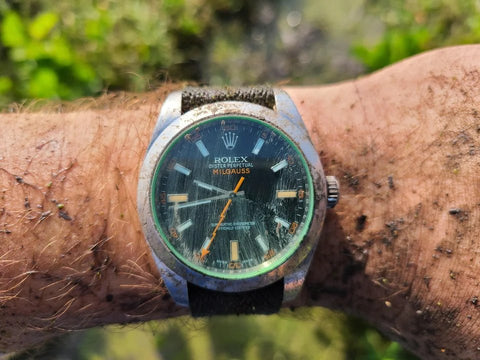
Our watches get dirty from the everyday exposure to dust, sweat, and even skin oils. Over time, this buildup can affect not only the appearance of your watch but also its functionality.
What Are the Potential Effects of a Dirty Watch on Its Function and Appearance?
A dirty watch can first become unattractive and potentially uncomfortable to wear. In the long run, the accumulation of dirt and grime can cause the watch parts to corrode, compromising its performance.
The Potential of Vinegar as a Cleaning Agent
What Is Vinegar?

Vinegar is a sour-tasting liquid made from fermented ethanol and water, which is often used as a condiment or preservative, but also has various household uses including as a cleaning agent.
What Are the Properties of Vinegar That Could Aid in Cleaning Watches?
Vinegar contains acetic acid. This property allows it to dissolve and lift off mineral deposits, grease, and dirt - factors that deem it a potential choice for cleaning watches.
Why Is Cleaning Watches with Alcohol a Common Practice?
People clean watches with alcohol because it is effective at dissolving oils and sanitizing surfaces. But, it should be used carefully since it can cause damage to certain watch materials.
How Does Vinegar Interact With Different Watch Parts?
Can You Clean Watch Crystal with Vinegar?
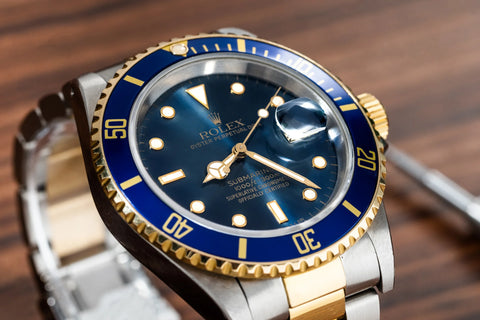
It's not recommended to clean watch crystals with vinegar. The acetic acid content in vinegar could potentially harm the crystal, especially if it's made of materials like acrylic or certain types of plastic.
Is Vinegar Good for Cleaning Watch Bracelets and Bezels?
Yes, vinegar can be an effective cleaning agent for watch bracelets and bezels, especially if they are made of metal or ceramic. However, be sure to rinse well to avoid any potential for vinegar-induced corrosion.
Is Vinegar Best to Clean Old Metal Watch Bands?
Vinegar can be an all-purpose cleaner for metal watch bands, but it is not necessarily the best for old or delicate bands. Vinegar is acidic, and it can be harsh on some metals, especially if it is left on for too long. If you are cleaning an old or delicate metal watch band, it is best to use a milder solution.
Can You Clean Rubber and Silicone Straps With Vinegar?
You can clean rubber and silicone watch straps with vinegar. However, make sure to rinse thoroughly and dry properly as prolonged exposure can degrade these materials.
Can You Clean a Leather Watch Band with Vinegar?
Cleaning leather watch bands with vinegar should be avoided. Its acidic nature can dry out the leather, causing it to dull and crack over time.
Can You Clean Fabric Watch Bands With Vinegar?
While you can clean fabric watch bands with vinegar, it's important to test on an inconspicuous area first. Vinegar could potentially discolor certain fabric types.
Is Vinegar Proven Effective to Eliminate Odours on Watch Bands, Especially Leather and Fabric Types?
Vinegar can help in eliminating odours by killing bacteria. However, as mentioned, it's not recommended to use on leather and certain fabric types due to potential discoloration and damage. Ensure to rinse thoroughly to remove the vinegar smell on your watches.
Can Vinegar Be Used to Clean Any Types of Watches?
Can You Clean Apple Watches With Vinegar?
You should avoid cleaning Apple watches with vinegar. Its components and materials may be sensitive to vinegar's acidic nature which could potentially result in damage.
Can You Clean Vintage or Old Watches With Vinegar?
Cleaning vintage or old watches with vinegar might not be the best idea. The delicate nature and potential variance in materials used in these antiquities make them susceptible to the corrosive nature of vinegar.
Can You Clean Luxury Watches with Vinegar?
Luxury watches are an investment, and it's wise to use only recommended cleaning methods for such precious items. Using vinegar comes with the risk of discoloration or damage to sensitive parts.
Can You Clean Water-Resistant Watches With Vinegar?
Water-resistant watches can be cleaned with vinegar, but caution is necessary. Due to the acetic acid, you should ensure that all parts are rinsed thoroughly and dried properly.
Can You Clean a Smartwatch With Vinegar?
Cleaning a smartwatch with vinegar is generally not recommended. Vinegar has the potential to harm sensitive touchscreens or damage seals that keep the device waterproof.
What Are the Potential Risks of Using Vinegar on a Watch?
1. Corrosion
Vinegar, with its acidic nature, may corrode metal parts of your watch. This could result in discoloration, rust, or even the eventual deterioration of these parts over time.
2. Damage to Seals and Gaskets
Watches typically utilize rubber or plastic seals to protect intricate components from water damage. However, regular exposure to vinegar can weaken these parts, possibly leading to cracks and leaks. This could consequentially result in internal water damage and impair your timepiece's functionality.
3. Harm to the Face and Lenses
Your watch's face and lens, often constructed from crystal or glass, could fall victim to streaks or spots due to vinegar. Even worse, the acetic acid in vinegar might damage any protective coatings that are on these delicate surfaces.
4. Impact on Internal Machinery
If vinegar manages to infiltrate the internal workings of your watch, the acidic substance could wreak havoc on those delicate components. This can lead to significant performance deficits and, in the worst-case scenario, total watch malfunction.
5. Potential for Harm Over Time
Even if immediate harm isn't visually evident post-vinegar cleaning, repeated exposure can accumulate hidden damage over time. This could lead to unpredictable and sudden watch failures.
6. Negative Impact on Bands
Depending on your watch band's material, vinegar could lead to various forms of damage. It could dry out leather, causing it to crack, or potentially discolor bands made from fabric or plastic.
7. Impact on Watch Value
For those who splurge on luxury or collector's watches, using cleaning methods, such as vinegar, which aren't manufacturer-recommended, can lead to a decrease in the timepiece's overall value.
How to Properly Use Vinegar to Clean a Watch?
Follow these steps to clean your watch using vinegar:
- Prepare Your Vinegar Solution: Do note that it is recommended to dilute the vinegar with water for a milder solution. A 50-50 mixture is a good starting point.
- Strip Down Your Watch: If possible, remove the band from the watch face. This way you can focus on cleaning the band without risking damage to the watch's internal components.
- Dip a Soft Toothbrush in Your Vinegar Solution: Make sure it's not too wet to avoid dripping onto parts you don't intend to clean. You can also use a cotton ball or swab then gently glide it on your watch.
- Gently Scrub Your Watch: Be careful around delicate parts, and ensure all areas are cleaned.
- Pat Dry With a Microfiber Cloth: After cleaning, remove any excess moisture immediately.
- Air Dry: Leave your watch to air dry before reassembling.
Remember, cleaning your watch with vinegar involves risks. While vinegar can offer cleaning advantages, it may not be suitable for all watches. It's a good idea to test the vinegar solution in a small, inconspicuous area first to ensure it doesn’t cause discoloration or damage. Always consult your watch's user manual or speak to a professional before trying this cleaning method.
What Is the Best and Alternative Methods for Cleaning a Watch?
The best method may vary depending on your watch type and materials used. However, here is the tried-and-true alternative:
Soapy Cleaning Solution
Using a mild, soapy cleaning solution is the most safe and effective means of cleaning your watch. These are the steps to clean your watch using it:

1. Prepare Your Soapy Cleaning Solution: If you're on a budget and prefer something that can be found inside your home, you can mix lukewarm water with a mild dish soap. Avoid soaps with strong perfumes or chemicals that might damage your watch. However, it is best to use an all-natural yet powerful cleaning solutions specifically designed for cleaning watches to achieve a more safe, professional cleaning at home.
2. Disassemble Your Watch: If your watch allows it, remove the band from the face using a spring bar tool. This lets you clean thoroughly without risking water damage to the watch mechanics.
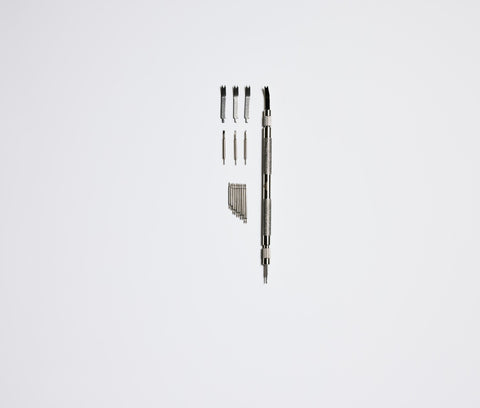
3. Dampen a Cloth or Use a Soft Brush: Dip a soft, microfiber cloth into the soapy water. Wring it out so it's not dripping. Alternatively, you can gently scrub your watch with a soft brush.
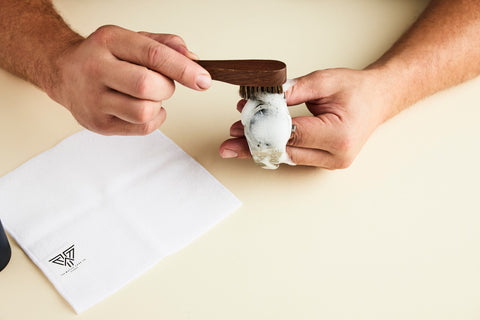
4. Clean Your Watch: Gently wipe down the face and the band of the watch. Be careful not to let water seep into any crevices.
5. Rinse: If your watch is water-resistant, rinse it under tepid water. If it isn't, dampen a new cloth with clean water and gently wipe off the soap.
6. Dry: Immediately dry your watch with a clean, dry cloth. Ensure no water remains on the watch.

7. Air Dry: Leave your watch to air dry for a couple of hours before reassembling. This ensures all potential hidden moisture has evaporated.
Conclusion
While vinegar has its merits as a versatile cleaning agent, it may not be the best option for maintaining the shine and function of your beloved timepieces due to its potentially corrosive nature. The risks may outweigh the benefits, particularly with valuable or delicate watches. Therefore, milder methods such as a simple soap-and-water solution or a commercial watch cleaning product may be a safer bet.
Always remember, preserving your watch's original elegance is about regular, careful cleaning and maintenance. Your watch is not just a fashion accessory, it's a statement of your style and precision, so it deserves nothing but the best care.


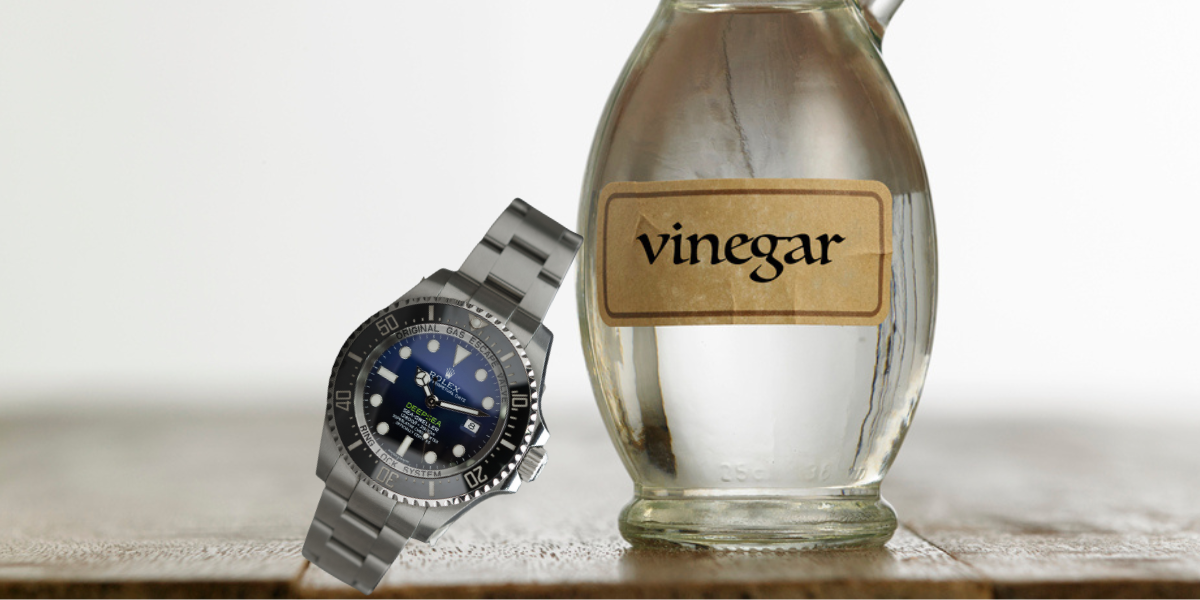
Share:
Top Secrets to Clean and Maintain a Leather Watch Strap
How to Maintain & Care For Your Luxury Mechanical Watch